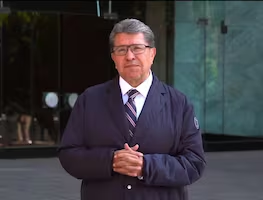Más Información

Inicia pago de la Pensión del Bienestar del bimestre enero-febrero; estas son las fechas de depósito

Violencia en el país evidencía colapso de estrategia de seguridad: PRI; insiste en cambiar el rumbo de combate

Defensa toma protesta al general Maximiliano Cruz Ramos; fungirá como Inspector y Contralor General de División de Estado Mayor

Sheinbaum destaca reducción de homicidios dolosos en último mes de 2024; “Confiamos en nuestra estrategia”, dice

Sheinbaum no hablará de seguridad en reunión con presidentes municipales; revisarán tema de infraestructura

Monreal reitera apoyo a Sheinbaum para este 2025; “la conducción del país está en buenas manos”, dice
An appeals court in Mexico revoked organized crime charges against one of the key suspects in the disappearance of 43 college students two years ago, after the man claimed he was tortured by police and prosecution agents.
The court last month ordered a lower court judge to re-assess whether Sidronio Casarrubias should be tried on the charges, prosecutors said Wednesday. They said the judge was instructed to investigate the suspect's claim of being tortured.
Casarrubias is an alleged leader of the Guerreros Unidos gang, which the government alleges killed the students in September 2014 and incinerated the bodies.
Prosecutors said the ruling does not free Casarrubias, because he faces two other charges for weapons possession and drug trafficking.
But it does mark a second setback for the case put forward by prosecutors in the highest-profile criminal investigation in recent memory.
Last year, a court granted an injunction for 22 police officers arrested for allegedly turning the students over to the gang. The injunction ordered the judge overseeing the case to correct prosecutorial errors, including inconsistent testimony and scant evidence. If those can't be fixed, the case would be thrown out.
The case of the 43 teachers' college students is one of the most widely protested and troubling examples of human rights abuses in Mexico's recent history - one that has shaken faith in all levels of government.
Federal prosecutors say local police killed several people, then rounded up the students and handed them over to a drug cartel. It says gang members killed the youths, possibly because they suspected the students were linked to rival criminals.
The bodies have not been found, the motives are in dispute, and outside investigators have suggested that state and perhaps even federal agents may have played a role in the disappearances.
In court documents, Casarrubias said a detective with the prosecutors' office abused him for hours after his arrest in February 2015.
"This man here was one of the first to torture me," Casarrubias said, according to the documents as he pointed to the detective, Gabriel Valle Campos.
"He sat on my stomach and asphyxiated me with black plastic bags. And he raped me with a metal object," Casarrubias said. "He threatened to torture my family, my children, the same way he was doing to me."
The appeals court said in its Aug. 26 ruling that there were several problems of procedure, evidence or argumentation in the prosecution's case.
But it also said that "independently of how it (the lower court) rules on the defendant's legal situation, an immediate and impartial investigation should be started into the allegedly acts of torture and mistreatment ... because of the repercussion it could have on the legal proceedings against the defendant."
Once public interest began to mushroom over the students' disappearance, Mexican authorities quickly rounded up dozens of suspects and announced they had solved the case.
Two independent, international teams of experts subsequently cast doubt on the official investigation.
And the court documents seen by The Associated Press show that 10 of the suspects - mainly alleged drug gang members - described a similar script of torture by police or military personnel: first questions, then punches, electric shocks and partial asphyxiations with plastic bags. Finally, there were threats to kill their loved ones unless they confessed to stories that backed up the government's line, they said.
Some said they were given planted evidence or prefabricated stories to support the government's conclusions.
Medical reports published by the Inter-American Human Rights Commission appear to confirm the allegations of torture.



